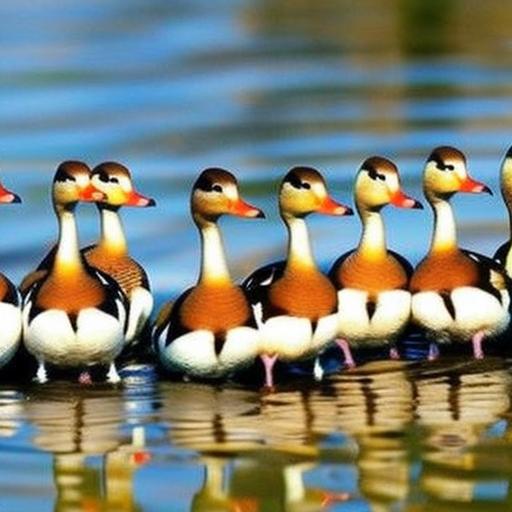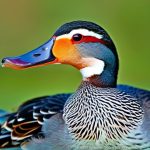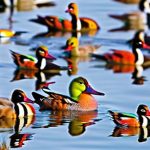Ducks have been domesticated for thousands of years, with evidence of their presence in ancient Egyptian and Chinese cultures. They were originally bred for their meat and eggs, but over time, people began to appreciate their unique qualities as pets. Small duck breeds, in particular, have gained popularity due to their manageable size and charming personalities.
Small duck breeds make great pets for a variety of reasons. Firstly, they are low maintenance compared to other pets. Ducks are relatively independent animals and require minimal grooming. They are also hardy creatures that can adapt to different environments, making them suitable for both urban and rural settings.
Additionally, small duck breeds have unique personalities that make them endearing companions. They are known for their playful and curious nature, often entertaining their owners with their antics. Ducks are also social animals and can form strong bonds with their human caregivers.
Lastly, small duck breeds can provide a practical benefit in the form of egg production. While not all small duck breeds are prolific layers, many of them do produce eggs regularly. This can be a rewarding aspect of owning ducks as pets, as you can enjoy fresh eggs while also providing a natural and sustainable food source for your family.
Key Takeaways
- Small duck breeds make great pets for those who have limited space and want a unique companion.
- Owning a small duck breed can provide emotional support, entertainment, and even help with pest control.
- Popular small duck breeds include the Call Duck, the Mandarin Duck, and the Wood Duck.
- When choosing a small duck breed, consider factors such as temperament, noise level, and space requirements.
- Small ducks require a safe and secure outdoor environment, access to water, and a balanced diet to thrive.
Benefits of Owning a Small Duck Breed
1. Low maintenance pets: Small duck breeds require minimal grooming and upkeep compared to other pets. They do not need to be walked or exercised like dogs, and their feathers are naturally waterproof, so they do not require frequent bathing. Ducks are also relatively clean animals and can be easily trained to use a designated area for bathroom purposes.
2. Unique personalities: Small duck breeds have charming personalities that make them delightful companions. They are known for their playful nature and love to explore their surroundings. Ducks are also highly social animals and can form strong bonds with their human caregivers. They enjoy interacting with their owners and can provide hours of entertainment with their curious and mischievous behavior.
3. Entertainment value: Ducks are highly entertaining animals to watch and interact with. They have a natural curiosity and love to explore their environment. Whether it’s splashing in a pond, foraging for insects, or simply waddling around the yard, ducks can provide endless amusement for their owners. Their playful nature and unique behaviors make them a source of joy and laughter.
4. Egg production: Many small duck breeds are prolific layers and can provide a practical benefit in the form of fresh eggs. While not all ducks will lay eggs consistently, breeds such as the Call duck and Miniature Appleyard duck are known for their egg-laying abilities. This can be a rewarding aspect of owning ducks as pets, as you can enjoy the satisfaction of collecting and consuming your own fresh eggs.
Characteristics of Popular Small Duck Breeds
1. Call ducks: Call ducks are one of the smallest domesticated duck breeds, weighing only around 1-2 pounds. They are known for their distinctive vocalizations, which sound like a high-pitched whistle or “call.” Call ducks come in a variety of colors and patterns, making them visually appealing pets. They have friendly and sociable personalities, making them great companions for both children and adults.
2. Bantam ducks: Bantam ducks are small-sized ducks that are bred specifically for their diminutive stature. They come in various colors and patterns, including solid colors, pied patterns, and crested varieties. Bantam ducks are known for their friendly and docile nature, making them suitable pets for families with children. They are also good layers, producing small to medium-sized eggs.
3. Miniature Appleyard ducks: Miniature Appleyard ducks are a smaller version of the popular Appleyard duck breed. They have the same distinctive appearance with their upright stance, round bodies, and colorful plumage. Miniature Appleyard ducks are known for their friendly and sociable personalities, making them great pets for families. They are also good layers, producing medium-sized eggs.
4. East Indies ducks: East Indies ducks are small-sized ducks with a unique appearance. They have a black plumage with a metallic green sheen, giving them an elegant and striking appearance. East Indies ducks are known for their friendly and sociable personalities, making them great pets for families. While they are not prolific layers, they can still produce a moderate number of small to medium-sized eggs.
Choosing the Right Small Duck Breed for Your Home
When choosing a small duck breed as a pet, there are several factors to consider:
1. Space and environment: Ducks require adequate space to roam and access to water for swimming and bathing. Consider the size of your yard or living space and ensure that it can accommodate the needs of the duck breed you choose. If you have limited outdoor space, you may need to consider alternative housing options such as a large pen or access to a nearby pond or lake.
2. Personal preferences: Consider your personal preferences for appearance and temperament when choosing a small duck breed. Some people may prefer the colorful plumage of Call ducks or the unique appearance of East Indies ducks. Others may prioritize friendly and sociable personalities, making breeds like Bantam ducks or Miniature Appleyard ducks more suitable.
3. Availability: Check the availability of different duck breeds in your area. Some breeds may be more common and easier to find, while others may be rarer and harder to come by. Research local breeders or rescue organizations that specialize in ducks to find out what breeds are available near you.
Housing and Environment Requirements for Small Duck Breeds
1. Indoor and outdoor housing options: Ducks require both indoor and outdoor housing options to meet their needs. They need a secure and predator-proof shelter to protect them from the elements and potential predators. This can be a shed, coop, or converted garage. Ducks also need access to a secure outdoor area where they can roam, forage, and access water for swimming and bathing.
2. Water requirements: Ducks are water-loving animals and require access to water for swimming and bathing. They also need water to help them digest their food properly. Provide a shallow pool or pond for your ducks to swim in, ensuring that it is clean and regularly maintained. Ducks can make a mess with their water, so consider using a large tub or kiddie pool that can be easily cleaned.
3. Temperature and climate considerations: Ducks are hardy animals that can adapt to different climates, but they do have specific temperature requirements. They need protection from extreme heat and cold, so ensure that their housing provides adequate insulation and ventilation. In colder climates, consider using a heat source such as a heat lamp or heated water bowl to keep your ducks warm during the winter months.
Feeding and Nutrition for Small Duck Breeds

1. Appropriate diet for ducks: Ducks require a balanced diet that consists of both commercial duck feed and fresh foods. Commercial duck feed should make up the majority of their diet and should be specifically formulated for ducks. It is important to choose a feed that is appropriate for the age and breed of your ducks. Supplement their diet with fresh fruits, vegetables, and insects to provide additional nutrients and variety.
2. Treats and supplements: Ducks enjoy treats and supplements as part of their diet. Offer them small amounts of treats such as mealworms, peas, or lettuce as a special treat. Avoid feeding them bread or other processed human foods, as these can be harmful to their health. Additionally, ducks may benefit from supplements such as poultry grit or oyster shell to aid in digestion and eggshell production.
3. Water requirements: Ducks require access to clean and fresh water at all times. They need water for drinking, bathing, and digestion. Ensure that their water source is clean and regularly refreshed to prevent the growth of bacteria or algae. Ducks may also benefit from a shallow dish or container filled with water for them to dip their bills in and clean their eyes.
Health and Care for Small Duck Breeds
1. Common health issues: Like any pet, ducks can be prone to certain health issues. Common health issues in ducks include respiratory infections, parasites, bumblefoot, and egg binding in females. It is important to monitor your ducks’ health regularly and seek veterinary care if you notice any signs of illness or discomfort.
2. Preventative care: Preventative care is essential to keep your ducks healthy. This includes regular cleaning of their housing and water sources, providing a balanced diet, and ensuring they have access to fresh water at all times. Regularly check your ducks’ feet for signs of bumblefoot and trim their nails if necessary. Additionally, provide regular dust baths or access to sandy areas to help prevent mites and lice.
3. Veterinary care: Ducks may require veterinary care from time to time. Find a veterinarian who specializes in avian or poultry medicine and establish a relationship with them. Schedule regular check-ups for your ducks and seek veterinary care if you notice any signs of illness or injury. Vaccinations may also be recommended depending on the area and the specific health risks for ducks.
Training and Socialization for Small Duck Breeds
1. Basic training techniques: Ducks can be trained using positive reinforcement techniques. Start by establishing a bond with your ducks through regular interaction and feeding. Use treats as rewards for desired behaviors such as coming when called or following simple commands. Ducks are intelligent animals and can learn basic commands with patience and consistency.
2. Socialization with humans and other pets: Ducks are social animals and can form strong bonds with their human caregivers. Spend time with your ducks regularly, talking to them and handling them gently. Introduce them to other pets in a controlled and supervised manner to ensure their safety. Ducks can get along well with other animals, but it is important to monitor their interactions and provide a safe and secure environment.
3. Importance of mental stimulation: Ducks are intelligent animals that require mental stimulation to prevent boredom and behavioral issues. Provide them with toys, puzzles, and foraging opportunities to keep them mentally engaged. Ducks also enjoy exploring their environment, so allow them access to different areas of your yard or provide them with a variety of objects to investigate.
Common Misconceptions About Small Duck Breeds as Pets
1. Messiness and odor: Ducks are often associated with messiness and odor, but with proper care and maintenance, these issues can be minimized. Regular cleaning of their housing and water sources can help prevent odors. Ducks can be trained to use a designated area for bathroom purposes, reducing messiness. Additionally, providing ample space for ducks to roam and access to water for swimming and bathing can help keep them clean.
2. Noise level: Ducks are not as noisy as chickens or other poultry, but they do make some noise. They are known for their quacking, which can be loud at times. However, small duck breeds such as Call ducks or Bantam ducks tend to have softer quacks compared to larger duck breeds. If noise is a concern, consider choosing a breed known for its quieter vocalizations.
3. Compatibility with other pets: Ducks can generally get along well with other pets if introduced properly and supervised. They can form bonds with dogs, cats, and even chickens if given the opportunity. However, it is important to monitor their interactions and provide a safe and secure environment for all animals involved.
Is a Small Duck Breed Right for You?
In conclusion, small duck breeds can make wonderful pets for those who are willing to provide the necessary care and attention. They offer a unique combination of low maintenance, entertainment value, and practical benefits such as egg production. However, it is important to consider the specific needs and requirements of small duck breeds before bringing them into your home.
Research different breeds, visit local breeders or rescue organizations, and consult with experienced duck owners to gather as much information as possible. Consider your space and environment, personal preferences, and the availability of breeds in your area. Ducks can bring joy and companionship to your life, but they also require commitment and responsibility.
If you are willing to provide the necessary care and attention, a small duck breed may be the perfect addition to your family. With their unique personalities and charming nature, ducks can bring endless entertainment and joy to your home. So why not consider adding a small duck breed to your family?
If you’re considering small duck breeds as pets, it’s important to provide them with a suitable living environment. One crucial aspect is the design and setup of their coop and nest box. To learn more about creating the perfect space for your feathered friends, check out this informative article on poultrywizard.com: Chicken Coop Nest Box: A Guide to Keeping Your Ducks Comfortable. It offers valuable insights and practical tips for ensuring your ducks’ safety, comfort, and overall well-being.
FAQs
What are small duck breeds?
Small duck breeds are domesticated ducks that are smaller in size compared to other duck breeds. They are usually kept as pets and are known for their friendly and docile nature.
What are some examples of small duck breeds?
Some examples of small duck breeds include Call ducks, Bantam ducks, Mandarin ducks, and Wood ducks.
What are the benefits of keeping small duck breeds as pets?
Small duck breeds make great pets because they are easy to care for, require less space compared to larger breeds, and are known for their friendly and social nature. They also produce smaller amounts of waste, making them ideal for those who live in urban areas.
What kind of environment do small duck breeds need?
Small duck breeds require a clean and safe environment with access to water for swimming and drinking. They also need a shelter that protects them from predators and extreme weather conditions.
What do small duck breeds eat?
Small duck breeds eat a diet that consists of commercial duck feed, fresh vegetables, and fruits. They also require access to clean water for drinking and swimming.
Can small duck breeds be kept with other pets?
Small duck breeds can be kept with other pets, but it is important to supervise them to ensure that they do not harm each other. They can also be kept with other ducks of similar size and temperament.
What is the lifespan of small duck breeds?
The lifespan of small duck breeds varies depending on the breed and the care they receive. On average, small duck breeds can live up to 10 years or more with proper care.
Meet Walter, the feathered-friend fanatic of Florida! Nestled in the sunshine state, Walter struts through life with his feathered companions, clucking his way to happiness. With a coop that’s fancier than a five-star hotel, he’s the Don Juan of the chicken world. When he’s not teaching his hens to do the cha-cha, you’ll find him in a heated debate with his prized rooster, Sir Clucks-a-Lot. Walter’s poultry passion is no yolk; he’s the sunny-side-up guy you never knew you needed in your flock of friends!







